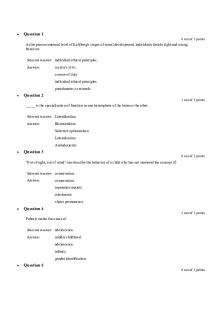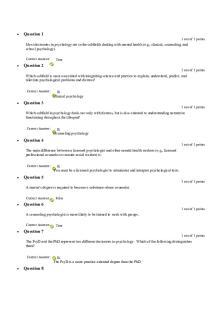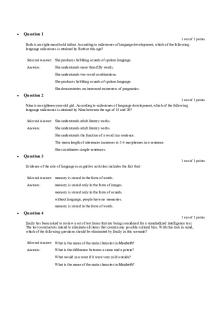Quiz 9 - Weekly Quiz PDF

| Title | Quiz 9 - Weekly Quiz |
|---|---|
| Author | Skyler Ballesteros |
| Course | Gen Psychology |
| Institution | Indiana State University |
| Pages | 6 |
| File Size | 91.7 KB |
| File Type | |
| Total Downloads | 14 |
| Total Views | 161 |
Summary
Weekly Quiz...
Description
Question 1 0 out of 1 points
At the preconventional level of Kohlberg's stages of moral development, individuals decide right and wrong based on: Selected Answer: individual ethical principles. Answers:
society's laws. a sense of duty. individual ethical principles. punishments or rewards.
Question 2 1 out of 1 points
_____ is the specialization of function in one hemisphere of the brain or the other. Selected Answer: Lateralization Answers:
Bicameralism Selective optimization Lateralization Ambidexterity
Question 3 0 out of 1 points
"Out of sight, out of mind" can describe the behavior of a child who has not mastered the concept of: Selected Answer: conservation. Answers:
conservation. separation anxiety. attachment. object permanence.
Question 4 1 out of 1 points
Puberty marks the onset of: Selected Answer: adolescence. Answers:
middle childhood. adolescence. infancy. gender identification.
Question 5 0 out of 1 points
If children cannot grasp the concept of conservation, they are unable to: Selected Answer: think intuitively. Answers:
make judgments based on gut feelings. think intuitively. recognize that the quantity of a substance remains the same despite changes in its shape. represent their world with words, images, and drawings.
Question 6 1 out of 1 points
Infant attachment is defined as the close emotional bond between an infant and: Selected Answer: its caregivers. Answers:
other infants. strangers. its caregivers. its environment.
Question 7 1 out of 1 points
According to developmental psychologists, nature refers to: Selected Answer: an individual's biological inheritance. Answers:
an individual's environmental experiences. an individual's social experiences. an individual's biological inheritance. an individual's emotional characteristics.
Question 8 0 out of 1 points
If 20-year-old Peter is unsure of what he should do with his life and where he fits in, Erikson would most likely agree that Peter did not successfully complete the stage of: Selected Answer: autonomy versus shame and doubt. Answers:
intimacy versus isolation. generativity versus stagnation. autonomy versus shame and doubt. identity versus identity confusion.
Question 9 1 out of 1 points
In Harry Harlow's classic attachment study, they found that monkeys:
Selected Answer: were more attached to artificial mothers who were warm and soft. Answers:
were more attached to artificial mothers who provided milk. were more attached to artificial mothers who were warm and soft. displayed no preference for either cloth or wire mothers. preferred wire mothers over cloth ones.
Question 10 1 out of 1 points
Which of the following is a difference between older and younger adults? Selected Answer:
Older adults tend to not do as well as younger adults in most aspects of memory.
Answers:
Younger adults are usually wiser than older adults. Older adults process information faster than younger adults. Older adults tend to not do as well as younger adults in most aspects of memory. Younger adults usually take longer than older adults to remember information about world knowledge.
Question 11 1 out of 1 points
According to Piaget, accommodation refers to: Selected Answer: the adjustment of current schemas in order to make sense of new experiences. Answers:
the parental efforts made to include new children in an existing family structure. the incorporation of new information into existing knowledge. the developmental changes in a child's behavior that facilitate social acceptance by peers. the adjustment of current schemas in order to make sense of new experiences.
Question 12 0 out of 1 points
Assimilation allows the person to enjoy a feeling of meaning, because: Selected Answer: new experiences create new schemas. Answers:
it modifies current ways of thinking. new experiences create new schemas. experiences fit into his or her preexisting schemas. it makes sense of life's previously incomprehensible events.
Question 13 0 out of 1 points
Jason is working on a problem for his science class and is systematically going over every possible outcome. Jason is in the _____ stage of cognitive development.
Selected Answer: concrete operational Answers:
sensorimotor formal operational concrete operational preoperational
Question 14 1 out of 1 points
Which of the following terms means that even in the face of adversity, a person shows signs of positive functioning? Selected Answer: Resilience Answers:
Assimilation Accommodation Resilience Integrity
Question 15 1 out of 1 points
Which of the following best defines teratogen? Selected Answer: It is any agent that causes a birth defect. Answers:
It is any agent that causes a birth defect. It is a drug that enhances the growth of a fetus. It is any chemical that contains an alcohol group. It is a term used to describe all microorganisms that cause fatal diseases.
Question 16 1 out of 1 points
The ability to multiply two numbers together falls under _____ development. Selected Answer: cognitive Answers:
physical cognitive socio-emotional personality
Question 17 1 out of 1 points
The _____ technique in studying infant perception involves searching for a reliable preference for one stimulus over another.
Selected Answer: preferential looking Answers:
habituation preferential looking object permanence non-differential perception
Question 18 1 out of 1 points
Which psychologist articulated the steps of cognitive development from infancy to adulthood? Selected Answer: Piaget Answers:
Maslow Piaget Erikson Kohlberg
Question 19 1 out of 1 points
The main class of male sex hormones is: Selected Answer: androgens. Answers:
estrogens. androgens. estradiol. cortisol.
Question 20 1 out of 1 points (Extra Credit)
The documentary titled "56 Up" is a great example of a _____________ study in development. Selected Answer: longitudinal Answers:
cross-sectional correlational genetic longitudinal
Question 21 1 out of 1 points
A(n) _____ assesses the same participants multiple times over a lengthy period. Selected Answer: longitudinal study Answers:
cross-sectional study
longitudinal study accelerated study unobtrusive research...
Similar Free PDFs

Quiz 9 - Weekly Quiz
- 6 Pages

QUIZ 2 - Weekly Quiz
- 2 Pages

Quiz 8 - Weekly Quiz
- 6 Pages

Quiz 3 - Weekly Quiz
- 6 Pages

Quiz 5 - Weekly Quiz
- 6 Pages

Quiz 10 - Weekly Quiz
- 6 Pages

Quiz 2 - Weekly Quiz
- 6 Pages

Chapter 12 Quiz - Weekly Quiz
- 3 Pages

Chapter 8 Quiz - Weekly Quiz
- 3 Pages

AP quiz+answers - Weekly quiz
- 1 Pages

Quiz 9 b - Quiz
- 2 Pages

Weekly Quiz 1 Solutions
- 3 Pages

Titas Weekly Quiz 5
- 2 Pages

Chapter 9 Quiz - Quiz
- 8 Pages

Weekly Quiz Checkpoint
- 10 Pages
Popular Institutions
- Tinajero National High School - Annex
- Politeknik Caltex Riau
- Yokohama City University
- SGT University
- University of Al-Qadisiyah
- Divine Word College of Vigan
- Techniek College Rotterdam
- Universidade de Santiago
- Universiti Teknologi MARA Cawangan Johor Kampus Pasir Gudang
- Poltekkes Kemenkes Yogyakarta
- Baguio City National High School
- Colegio san marcos
- preparatoria uno
- Centro de Bachillerato Tecnológico Industrial y de Servicios No. 107
- Dalian Maritime University
- Quang Trung Secondary School
- Colegio Tecnológico en Informática
- Corporación Regional de Educación Superior
- Grupo CEDVA
- Dar Al Uloom University
- Centro de Estudios Preuniversitarios de la Universidad Nacional de Ingeniería
- 上智大学
- Aakash International School, Nuna Majara
- San Felipe Neri Catholic School
- Kang Chiao International School - New Taipei City
- Misamis Occidental National High School
- Institución Educativa Escuela Normal Juan Ladrilleros
- Kolehiyo ng Pantukan
- Batanes State College
- Instituto Continental
- Sekolah Menengah Kejuruan Kesehatan Kaltara (Tarakan)
- Colegio de La Inmaculada Concepcion - Cebu
